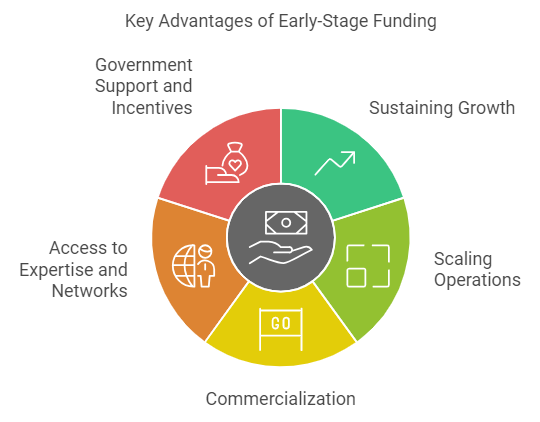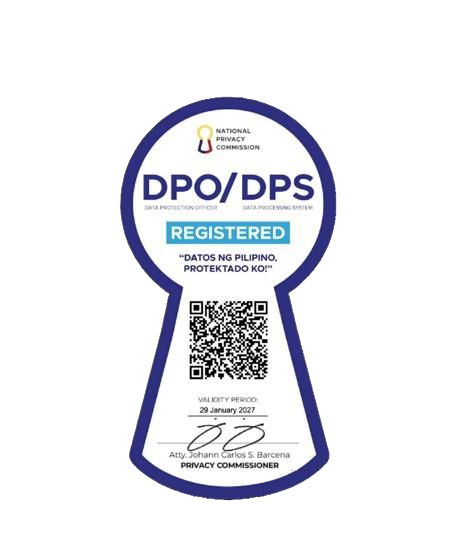Starting a business is no small feat, especially in the dynamic landscape of the Philippines, and one primary challenge entrepreneurs face is securing adequate funding to transform their innovative ideas into successful ventures.
The struggle to obtain startup funding involves navigating a complex web of financial sources and overcoming local market hurdles. Hence, in this article, we will unravel and explain the role of funding in the growth and scalability of startups in the Philippines, touching on early-stage funding opportunities, notable angel investors, and the impact of venture capital.
Moreover, we will also discover how different funding stages and support systems can make or break a Filipino startup's journey. So, without further ado, let us get down to it.

Importance of Startup Funding in the Philippines

When we talk about the startup ecosystem in the Philippines, funding is a critical factor. Startup funding is crucial for the growth and success of new businesses in the Philippines, playing a vital role in transforming innovative ideas into viable, scalable enterprises.
Here are key reasons why startup funding is essential for Philippine businesses -
1. Accelerating Business Growth
Funding provides startups the capital to scale their operations, expand their market reach, and accelerate product development. Without adequate funding, startups may struggle to grow quickly, limiting their ability to compete in the fast-paced business environment.
2. Encouraging Innovation
Access to funding enables entrepreneurs to invest in research and development, encouraging innovation. This is essential in the Philippine market, where startups often introduce new products, services, and technologies that address local challenges and create economic opportunities.
3. Job Creation
Startups play a significant role in job creation, particularly in emerging industries such as technology, fintech, and e-commerce. Funding allows startups to hire talent, thereby contributing to employment and skill development in the country.
4. Economic Development
Funding contributes to a business's broader economic development. Successful startups generate revenue, pay taxes, and refresh other sectors of the economy through their supply chains and consumer spending.
5. Attracting Global Investments
Well-funded startups in the Philippines can attract investments from local and international investors. This brings in additional capital and enhances the country’s reputation as a hub for innovation and entrepreneurship.
6. Reducing the Risk of Failure
Early-stage funding helps startups navigate the critical phases of their business journey, such as product development and market entry. Adequate funding reduces the risk of failure by providing the resources needed to overcome initial challenges.
Also Read: Best Lenders for Quick Cash Loans and Instant Same-Day Approval
Early Stage Funding Opportunities Available in The Philippines
Early-stage funding is like the soil that helps a seed grow into a thriving plant in the entrepreneurial landscape. That is why understanding the nuances of early-stage financing can be a game-changer, especially for startups in the Philippines.
Early-stage funding is crucial because it sets the foundation for a startup’s journey toward growth and sustainability. Without this initial capital, even the most innovative ideas can fail to take off.
Essentially, early-stage funding helps startups sustain initial growth, increase sales margins, and prepare for future expansion. It allows entrepreneurs to focus on product development, customer acquisition, and market entry without the immediate pressure of financial constraints.
There are two main types of early-stage funding: seed funding and angel investment.
1. Seed Funding
This is the first official equity funding stage. Investors, often including venture capitalists, entrepreneurs, and specialized organizations, provide capital in exchange for equity. Seed funding covers initial business expenses, from developing and marketing products to hiring the first set of employees.
2. Angel Investment
Angel investors are high-net-worth individuals who invest their own money in startups in return for convertible debt or equity. Along with financial resources, they often bring intellectual capital. Angel investors usually work in groups, pooling their resources to assess opportunities and spread risks.
Also Read: Qualifying for a Small Business Loan: Common Requirements and Steps
Critical Benefits of Early-Stage Funding For Startups in The Philippines
Early-stage funding offers several advantages for startups in the Philippines. Here are some notable ones -

1. Sustaining Growth
This type of funding helps startups maintain their initial growth phase and ensure they don’t run out of cash before achieving significant milestones. It also aids in increasing sales margins and gearing up for more substantial investment rounds.
2. Scaling Operations
Early-stage funding allows startups to scale their operations by investing in new equipment, technologies, and talent. It provides businesses with the financial flexibility to expand capabilities and explore new markets.
3. Commercialization
Funding at this stage supports the business in shifting from product development to market launch, facilitating the commercialization of a startup’s products or services. This is a crucial step for generating revenue and making a real-world impact.
4. Access to Expertise and Networks
Startups significantly benefit from the access to expertise, mentorship, and industry connections that angel investments and venture capital funds often provide. These resources can substantially influence a startup’s direction and strategic choices.
5. Government Support and Incentives
In the Philippines, the government actively nurtures early-stage startups. Agencies like the Department of Science and Technology (DOST), the Department of Trade and Industry (DTI), and the Department of Information and Communications Technology (DICT) offer various support mechanisms, including funding, mentorship, and training programs.
Additionally, the government provides various incentives to attract foreign investors and encourage local startup growth. Tax breaks, subsidies, and other forms of financial support can significantly enhance a startup’s ability to thrive.
As good as angel investors are, they aren’t without challenges, especially in the Philippines. Check out this Reddit thread, which discusses the lack of credible angel investors in the Philippines and the rise of malicious funding practices that businesses should be wary of.
Also Read: Understanding the Features, Importance, and How Microfinance Works
Skip the lengthy applications and secure your business’s future with N90’s fast financing solutions. Apply today and get loan approvals within 24 hours! Get the Financial Boost Your Philippine SME Needs Today!
Top Angel Investor Groups in the Philippines

Angel investor groups offer much-needed capital for early-stage startups, along with mentorship, expertise, and networking opportunities. Together, these groups and events form a vital support system, helping startups navigate the challenging entrepreneurial landscape.
Here, take a look at some of the top angel investor groups providing financial support to startups in the Philippines -
1. Manila Angel Investors Network (MAIN)
One of the Philippines' most notable angel investor groups is the Manila Angel Investors Network (MAIN). Established in 2016, MAIN has become the country's largest committed private investors network. It is a non-stock, non-profit corporation registered with the Philippines' Securities and Exchange Commission (SEC).
MAIN provides early-stage companies with capital funding, expertise support, and networking opportunities. It holds a robust portfolio of Filipino startups like Kumu, Booky, and Taxumo. Half of MAIN's investments are impact-focused, targeting financial inclusion, employment, education, and environmental sustainability.
2. Angel Investment Network Philippines
Angel Investment Network Philippines is another significant player in the local ecosystem. This online platform connects individual investors with startup founders who publish their business proposals on the site. With over 308,856 registered angel investors, it offers a vast pool of potential startup investors.
Entrepreneurs can register and showcase their business details, helping them catch the eye of interested investors. This structured approach allows for easy sorting and matching of investment goals and industry expertise, making it more straightforward for startups to find suitable angel investors.
3. Philippine Venture Capital Investment Group (PHILVENCAP)
The Philippine Venture Capital Investment Group (PHILVENCAP) also contributes significantly to the investment landscape. This private organization is devoted to creating a robust ecosystem for venture capital and private equity financing in the country.
Known for organizing events, conferences, workshops, and roundtable discussions, PHILVENCAP provides numerous avenues for stakeholders to exchange ideas and explore potential investment opportunities.
Startups benefit from these events, which provide platforms to pitch ideas, network with potential investors, and gain critical insights from industry experts.
4. Philippines Investment Network
Online platforms such as the Philippines Investment Network streamline the process of connecting entrepreneurs with angel investors. With a global network of over 1.9 million members, including 347,239 investors, this platform provides a substantial opportunity pool for startups.
It basically simplifies the matchmaking process, making it easier for startups to secure the critical funding needed to scale their ventures.
5. Seedinph. tech
Lastly, platforms like Seedinph. Tech provides an alternative for those considering non-traditional investment avenues. Small—to medium-sized companies request funding through a lending mechanism, offering monthly interest payouts.
This model can be an attractive option for investors looking to support businesses in a different capacity.
Are you still wondering what angel investors do? Check out this video. It discusses angel investing in the new normal, which is directly relevant to understanding current trends and methods in startup funding in the Philippines.
Also Read: Top Banks for Small Business Startup Loans in 2024
What is Growth Stage Funding in The Philippines?
When a startup matures past its initial phases and seeks expansion, it often turns to growth-stage funding. Venture capital (VC) firms typically provide this funding, which is pivotal for companies aiming to scale their operations.
Venture capital firms inject capital into startups in exchange for equity. Unlike traditional loan providers, VCs are betting on these companies' substantial growth potential to earn returns that surpass regular market interest rates.
Their value goes beyond just financial backing because they offer mentorship, strategic advice, and connections to help startups grow more robustly.
VC funding is multifaceted, typically segmented into several stages, each catering to different phases of a startup’s lifecycle. Take a look at the various stages involved in trying to avail of VC funding in the Philippines -
1. Seed Round
The Seed Round is the first layer of VC funding. It fuels startups' initial growth, often receiving investments ranging from PHP 848k to PHP 8.5 million in exchange for 6-10% equity.
This stage focuses on developing a minimum viable product (MVP) and establishing some early traction. Programs lasting 3-6 months often culminate in a 'Demo Day,' where startups pitch to secure more substantial funding.
2. Series-A
Once a startup has demonstrated some success and market potential, it moves to the Series-A round. The investment amounts are significantly higher because these startups have shown considerable user traction and are destined to scale up.
The goal now shifts from merely proving the concept to optimizing the product-market fit and expanding the user base.
3. Series-B
As the startup continues to grow, Series-B funding is introduced. This involves even more significant investments and often brings in established VC firms.
This stage's primary aim is to ramp up business operations, expand the market reach, and enhance the product according to the growing user base. This phase is particularly capital-intensive, requiring substantial financial resources to ensure the business can scale efficiently.
Also Read: Improving Efficiency in Finance Business Processes
Significance of Growth Stage Funding for Expanding Startups

Growth stage funding is crucial for startups that aim to advance from promising ventures to scalable, competitive businesses.
At this stage, the capital provided helps in several key areas. They are as follows -
- Scaling Operations: Funding allows for expanding production capabilities and operational reach.
- Talent Acquisition: Larger budgets enable startups to attract and retain top-tier talent, which is critical for sustained growth.
- Infrastructure Investment: This includes both physical and technological infrastructure necessary for scaling.
- Market Expansion: Additional funds enable startups to enter new markets, meet regulatory requirements, and adapt their products to fit the nuances of each new market segment.
Also Read: 10 Strategies to Increase Your Business Cash Flow
What Are Seed Accelerators in the Philippines?
Seed accelerators, often called startup accelerators, are specialized business programs designed to offer early-stage, growth-driven companies a structured pathway to success.
These accelerators aim to hasten the startup journey by providing education, mentorship, and crucial financing within a condensed timeframe of usually a few months.
Seed accelerators provide access to funding, mentorship, and networking opportunities, helping startups refine their business models, build teams, and secure essential investments.
Here, take a look at some of the notable ones operating in the Philippines -
1. Cerebro Labs
Cerebro Labs is a company incubator and accelerator that targets early-stage and pre-seed technology companies across varied sectors. This accelerator provides a 6-week curriculum to offer founders the necessary momentum through services, instruction, guidance, and essential launch tools.
Cerebro Labs focuses its substantial investments on sectors like eCommerce, healthcare, education, and artificial intelligence, ensuring startups in these fields receive specialized support.
2. Impact Accelerator Programme
Focused on building and scaling social enterprises, the Impact Accelerator Programme assists startups within the Philippines that align with the UN Sustainable Development Goals. This program includes mentoring, masterclasses, and workshops by industry experts, helping startups refine their business models, implement robust growth strategies, and prepare for investments.
3. Kickstart
Kickstart is another pivotal seed accelerator that provides robust support across various stages of startup development. Known for its dynamic resources, mentorship, and networking opportunities, Kickstart has been instrumental in helping startups scale rapidly.
This accelerator has a reputation for financing and developing a diverse range of startups, significantly contributing to the entrepreneurial ecosystem in the Philippines.
4. Launchgarage
Launchgarage is an accelerator focusing on financial technology, agriculture, aqua-tech, and BPO corporate software solutions. Acting as a bridge for company innovators, Launchgarage aids in developing long-term business ventures.
This accelerator provides structured pathways to achievement, ensuring startups receive the support and guidance necessary to thrive in their respective industries.
5. ON3 Technology Entrepreneurship Acceleration Program
ON3 is dedicated to accelerating the growth of technology startups. This program provides essential resources, seasoned mentorship, and significant networking opportunities to achieve market readiness.
6. Plug and Play Tech Center
A globally recognized name, the Plug and Play Tech Center also operates in the Philippines, offering support to startups at various stages. Known for its comprehensive resources, effective mentorship, and extensive networking opportunities, Plug and Play connects local startups to a global community, significantly enhancing their growth trajectory.
Also Read: Fast Business Loans for Quick Cash in 2024
Top 5 Venture Capital Firms Providing Financial Support To Businesses in the Philippines
When discussing the startup ecosystem in the Philippines, you must consider the impact and importance of venture capital (VC) firms. These firms provide funding, mentorship, and industry connections that can make or break a company.
Here, take a look at the top 5 venture capital firms providing financial support to startups in the Philippines -
1. Founders Launchpad
Founders Launchpad is an initiative or program designed to support early-stage startups by providing them with the necessary resources, mentorship, and funding to accelerate their growth.
Venture capital firms, startup incubators, or accelerators often run these programs.
Basically, Founders Launchpad focuses on helping entrepreneurs refine their business ideas, develop scalable products, and prepare for market entry.
2. Kaya Founders
Kaya Founders is a venture capital firm based in the Philippines that focuses on nurturing and investing in early-stage startups across Southeast Asia.
Founded by notable entrepreneurs and investors, Kaya Founders aims to support the growth of innovative companies by providing them with essential funding, strategic guidance, and access to a robust network of industry experts.
3. Foxmont Capital Partners
Foxmont Capital Partners is a Philippine-based venture capital firm that invests in early-stage startups across Southeast Asia, particularly in the Philippines. The firm is dedicated to supporting high-potential startups by providing financial capital, strategic guidance, and access to a network of industry experts.
Foxmont Capital Partners invests in diverse sectors, including technology, consumer goods, fintech, and e-commerce.
4. Gentree
Gentree Fund is a venture capital firm based in the Philippines. It was established by the Sy family and is known for its ownership of SM Investments Corporation.
Gentree primarily invests in early—to growth-stage startups across Southeast Asia, particularly in the technology, consumer goods, and retail sectors.
The firm aims to support innovative companies by providing financial capital and strategic guidance, completely utilizing the Sy family's extensive business network.
5. Kickstart Ventures
Kickstart Ventures is a leading venture capital firm based in the Philippines and founded by Globe Telecom. It focuses on investing in early-stage technology startups across Southeast Asia, aiming to nurture innovation and support the digital economy.
Kickstart Ventures provides financial capital, strategic mentorship, industry expertise, and access to a vast network of resources. The firm invests in various sectors, including fintech, e-commerce, and enterprise solutions.
Conclusion
As this article clearly explains, Angel investors are vital to the growth of startups in the Philippines. They offer more than just financial backing; they also provide invaluable guidance, industry connections, and strategic advice that can make all the difference between success and failure for early-stage ventures in the Philippines.
As the Philippine startup ecosystem continues to expand, angel investors' role will become increasingly crucial to nurturing innovation and helping startups scale up economically.
With a supportive network of angel investors, Filipino startups are better positioned to scale, innovate, and compete globally, contributing to the country’s overall economic development.
Frequently Asked Questions (FAQs)
1. How do you find investors for startups in the Philippines?
To find investors for startups in the Philippines, start by networking within the local startup ecosystem. Attend events, pitch competitions, and industry conferences to connect with potential investors.
Leverage online platforms like LinkedIn and AngelList to reach angel investors and venture capital firms. Join startup incubators or accelerators, such as Ideaspace or QBO Innovation Hub, which often have strong investor networks.
2. How much do angel investors invest in startups?
Angel investors typically invest between PHP 1.4 million and PHP 6 million in early-stage startups, though amounts can vary depending on the investor and the startup’s potential. In some cases, angel investors may invest up to PHP 28 million or more, especially if the startup shows significant promise or if the investor is part of a syndicate.
These investments are often in exchange for equity, intending to provide the startup with enough capital to reach critical milestones, such as product development or market entry.
3. What is the most prominent VC in the Philippines?
Kickstart Ventures is one of the largest venture capital firms in the Philippines. A subsidiary of Globe Telecom, it focuses on investing in early-stage startups across Southeast Asia, particularly in technology sectors. Kickstart Ventures provides significant funding, mentorship, and strategic support, making it a key player in the Philippine startup ecosystem.
4. What do angel investors get in return?
Angel investors typically receive equity in the startup in return for their investment. This equity represents ownership shares in the company, giving them a stake in the business. If the startup succeeds, angel investors profit through dividends or by selling their shares at a higher value during events like an acquisition or initial public offering (IPO).














